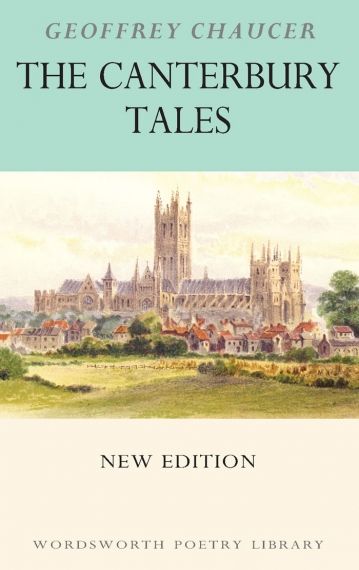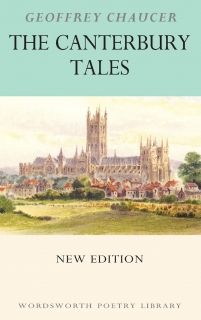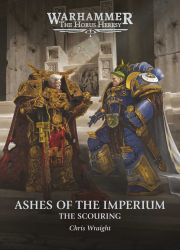It was Boccaccio’s Decameron which inspired Chaucer, in the 1390s, to begin work on The Canterbury Tales, which was still unfinished at his death in October 1400. It tells the story of a group of 30 pilgrims who meet at the Tabard Inn in Southwark, on the south bank of the Thames opposite the city of London, and travel together to visit the then famous shrine of St Thomas Becket in Canterbury cathedral. The tavern host, who accompanies them, suggests that they amuse one another along the way by telling stories. There will be a prize for this: the best storyteller will get a free meal in the tavern on their return. The stories told by the pilgrims range from bawdy comedies through saints’ lives and moral tracts to courtly romances, but are always delivered with a generous helping of Chaucer’s own sly wit and ironic humour. Although based on the stereotypes of ‘estates satire’, his pilgrims appear as individuals who can be recognised by their audience. Chaucer succeeds in his aim of producing an overview of his times and their culture, for posterity, in the manner of Italian, proto-Renaissance, writers. In the decades after his death, Chaucer was recognised and elevated by a new generation of writers to a position of prominence in the emerging canon of English writing, from which he ultimately became known as ‘the Father of English Literature’.
Условия за ползване
Условията за ползване накратко
Можете да намерите книга, която Ви интересува като разглеждате категориите или като използвате търсачката.
Регистрация в сайта не е задължителна.
Цената на доставката до България е фиксирана и не зависи от броя и теглото на поръчаното - 3.00 евро (5.87 лв.) до адрес и 2.50 евро (4.89 лв) до офис на Еконт.
Поръчки над 21.47 евро (42 лв.) ползват една безплатна доставка.
Приемаме плащане с наложен платеж - плаща се на куриера при получаване на книгите.
Приемаме плащане по банков път.
Обичаен срок на доставка - за налични стоки в магазина 2-3 работни дни.
Поръчките, направени преди 15 часа в работен ден, изпращаме същия ден.
Поръчките , направени след 15 часа в работен ден, изпращаме на следващия работен ден.
Поръчките, направени в официалните почивни дни, изпращаме на първия работен ден.
-за индивидуални поръчки на английски език между 35 и 90 дни, на немски език около 25-55 дни.
Търсене
Търсенето на книга се осъществява в полето за търсене в горния десен ъгъл на екрана. Резултатът може да е намерен в заглавието, автора, името на издателството и/или описанието на книгата.
Вашата книга можете да намерите и като разглеждате съдържанието на отделните категории в магазина.
Поръчка
Всеки продукт, който одобрите за покупка можете да прибавите в списък с избрани книги с натискане на бутона "Добави в количката".
Когато решите, че сте приключили с разглеждането и сте направили своя избор можете да видите резултата в полето "Мини количка" в десния горен ъгъл на екрана и да натиснете бутона "Виж и купи" за да видите подробности по поръчката, която правите.
На този етап можете да махнете някое от избраните заглавия чрез натискане на кръстчето срещу всяко от тях, да промените поръчваното количество или да се върнете към разглеждането на магазина с натискане върху надписа "Продължи с пазаруването".
Когато списъкът със заглавията и бройките, които искате да поръчате е готов можете да продължите с натискане на бутона "Поръчка".
Отваря се екран за незадължителна регистрация - можете да се регистрирате, да продължите с изписване на електронна поща и парола, ако вече сте регистрирани или да продължите поръчката като гост. В последния случай указаната електронна поща се използва само за осъществяване на кореспонденция с Вас относно направената поръчка, но губите бъдещата възможност да преглеждате старите си поръчки и да си спестите досадното попълване на адрес, телефон и други данни при всяка следваща поръчка.
В следващия екран се попълват дани за клиента - адрес, телефон и данни за фактура, ако искате да бъде издадена такава за покупката. Възможно е адресът за кореспонденция и този за доставка да се различават - различните данни се попълват на указаните места.
С бутон "Следваща стъпка" се преминава в екран, където се уточнават начините на плащане и доставка.
В монента предлагаме плащане само с наложен платеж.
С бутон "Следваща стъпка" отивате на екран Ревю за да прегледате отново данните за поръчката - какво сте поръчали, на какъв адрес ще се свързваме с Вас и на какъв ще доставим пратката, колко Ви струват книгите и колко доставката. Ако всичко е наред натиснете бутон "Финализирай поръчката" и така поръчката ще бъде направена.
Ще получите писмо на посочената от електронна поща с данни за поръчката. Ще получавате електронна поща или телефонно обаждане, ако има детайли за уточняване в процеса на изпълнение на поръчката.
Доставка
Доставката се осъществява от куриер на Еконт или служител на Букохолик. Заплащането е с наложен платеж в брой на куриера.
Сумата, която заплащате е равна на цената на заявените стоки заедно с разходите за доставка. Тази сума представлява авансово плащане по смисъла на чл. 53, ал. 1 от Закона за защита на потребителите, за извършването на което давате съгласие с натискане на бутона "Финализирай поръчката".
Връщане
Имате право да върнете в срок от 14 дни, считано от деня на покупката, закупената книга при спазване на следните условия:
1. Книгата да бъде с ненарушена цялост, без наранявания, одрасквания или външни повреди;
2. Да не са правени опити за късане на страници;
3. Да не са налице повреди, причинени от клиента поради невнимателно транспортиране или неправилна употреба;
4. Там, където в поръчката са включени консумативи или аксесоари, те да бъдат с ненарушена цялост на оригиналните им опаковки;
5. Транспортните разходи за връщането на книгата са за сметка на клиента.
















